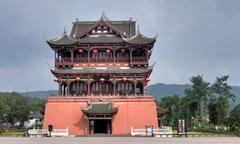Hongxing Bridge Station Chengdu: Visiting Hours, Tickets, and Comprehensive Travel Guide
Date: 04/07/2025
Introduction
Hongxing Bridge Station (红星桥站) stands as a key metro hub in central Chengdu, China, offering seamless access to both the city’s vibrant urban life and rich historical heritage. Serving Chengdu Metro Line 3, the station is ideally situated near the scenic Jin River and the historic Hongxing Bridge, placing visitors within easy reach of renowned attractions such as Chunxi Road, Wuhou Shrine, and Jinli Ancient Street. With modern amenities, accessible facilities, and multilingual signage, Hongxing Bridge Station ensures a convenient and enjoyable experience for both tourists and locals.
This detailed guide covers everything you need to know about visiting Hongxing Bridge Station—from operating hours and ticketing options to travel tips, nearby landmarks, and local experiences. Whether you’re a culture enthusiast, a food lover, or a first-time visitor, Hongxing Bridge Station is your gateway to exploring the captivating essence of Chengdu.
For official metro maps, fare details, and trip planning tools, visit TravelChinaGuide Metro Map and Trip.com Metro Guide.
Table of Contents
- Introduction
- Location and Connectivity
- Historical Significance and Urban Context
- Station Layout and Facilities
- Ticketing and Payment Methods
- Operating Hours and Train Schedules
- Key Attractions Near Hongxing Bridge Station
- Dining, Shopping, and Local Experiences
- Practical Travel Tips
- Transport Integration
- Cultural Insights
- Frequently Asked Questions (FAQ)
- Recommended Visuals
- Conclusion and Call to Action
- Guide to Wuhou Shrine
- Exploring the Station’s Surroundings
- Summary and Visitor Tips
- References and Further Reading
Location and Connectivity
Hongxing Bridge Station is centrally placed between Qianfeng Road and Chengdu Second People’s Hospital stations on Line 3, anchoring it within Chengdu’s extensive metro system, which features over 630 kilometers of track and 14 operational lines as of 2025. The station provides easy transfers to other major lines, enabling swift access to a variety of districts and attractions (TravelChinaGuide Metro Map).
Notable destinations within a few stops include:
- Chunxi Road: Chengdu’s bustling commercial center.
- Wuhou Shrine/Jinli Ancient Street: Key cultural and historical sites.
- Chengdu Zoo and Panda Base: Accessible via direct metro rides for wildlife enthusiasts.
Historical Significance and Urban Context
Named after the nearby Hongxing Bridge, a landmark over Chengdu’s urban waterways, the station area beautifully embodies the city’s blend of tradition and innovation. Historically a residential and commercial zone, the district’s transformation reflects Chengdu’s broader urban evolution. Since its opening during the Line 3 expansion in 2016, Hongxing Bridge Station has strengthened north-south city connectivity, linking suburban communities with the historic and commercial core (TravelChinaGuide Line 3 Details).
Station Layout and Facilities
Hongxing Bridge Station features a modern underground design with multiple entrances/exits, clear bilingual signage, elevators, and tactile paving for accessibility. Facilities include:
- Ticket vending machines and staffed counters
- Customer service desks
- Security checkpoints with efficient screening
- Clean restrooms, waiting areas, and convenience kiosks
- Real-time train information displays and regular announcements
The station is designed for comfort, safety, and efficient passenger flow.
Ticketing and Payment Methods
Ticketing is straightforward:
- Single-journey tickets: Available at vending machines and service counters; fares range from CNY 2–9 based on distance (TravelChinaGuide Ticket Fare).
- Tianfutong Card: A rechargeable smart card offering a 10% discount on metro fares, also valid on buses and some shared bikes. Purchase at metro counters, major supermarkets, or via WeChat/Alipay (Trip.com Metro Guide).
- Mobile payments: Widely accepted via Alipay and WeChat Pay QR codes.
- Children under 1.3 meters: Travel free.
Operating Hours and Train Schedules
- Operating Hours: Daily, approximately 6:00 AM to 11:00 PM.
- Train Frequency: Every 3–8 minutes during peak periods and 8–12 minutes off-peak (Trip.com Metro Guide).
Key Attractions Near Hongxing Bridge Station
Hongxing Bridge Station provides access to several of Chengdu’s top attractions:
- Chunxi Road: Premier shopping and entertainment district (TouristPlaces.Guide).
- Wuhou Shrine: Historic temple dedicated to Zhuge Liang, surrounded by tranquil gardens.
- Jinli Ancient Street: Traditional architecture, street food, artisan crafts, and lively atmosphere.
- People’s Park: A green urban oasis known for tea houses and cultural activities.
- Chengdu Zoo & Panda Base: Reachable on Line 3 for wildlife and panda encounters.
Dining, Shopping, and Local Experiences
The neighborhoods around Hongxing Bridge Station are a microcosm of Chengdu’s culinary and retail landscape:
- Dining: Try Sichuan classics like spicy hotpot, mapo tofu, and street snacks.
- Shopping: Wander traditional markets for handicrafts or visit modern malls for international brands.
- Teahouses: Experience local culture with tea and mahjong in riverside teahouses.
Practical Travel Tips
- Language: Bilingual signage is standard; translation apps are helpful as staff English levels vary.
- Peak Hours: Avoid 7:30–9:30 AM and 5:00–7:30 PM for a more comfortable ride.
- Safety: The metro is safe and clean, with routine security checks.
- Accessibility: Elevators, ramps, and priority seating are available.
- Connectivity: Free Wi-Fi in many stations; consider a local eSIM for data (Trip.com Metro Guide).
- Luggage: Small bags are allowed; no dedicated storage.
Transport Integration
Hongxing Bridge Station connects seamlessly to Chengdu’s wider transit network:
- Bus stops: Nearby for further city access.
- Taxis and ride-hailing: Didi and others readily available.
- Airport/rail links: Metro lines provide efficient connections to major terminals.
Cultural Insights
The area surrounding Hongxing Bridge Station showcases Chengdu’s balance of modernity and tradition. Wander local streets to find historic temples, teahouses, and lively markets—offering glimpses into authentic urban life (TouristPlaces.Guide).
Frequently Asked Questions (FAQ)
Q: What are the operating hours of Hongxing Bridge Station?
A: Daily from approximately 6:00 AM to 11:00 PM.
Q: How much are metro tickets?
A: CNY 2–9, depending on distance. Children under 1.3 meters ride free.
Q: Is the station accessible?
A: Yes; elevators, ramps, tactile paving, and priority seating are provided.
Q: What attractions are nearby?
A: Chunxi Road, Wuhou Shrine, Jinli Ancient Street, People’s Park, Chengdu Zoo.
Q: Are mobile payments accepted?
A: Yes, Alipay and WeChat Pay QR codes are widely accepted.
Recommended Visuals
- Exterior and interior station photos: Showcase entrances, signage, and amenities (alt text: “Hongxing Bridge Station entrance and modern metro facilities in Chengdu”).
- Metro map: Highlighting Line 3 and station connections (alt text: “Map of Chengdu Metro Line 3 showing Hongxing Bridge Station”).
- Landmark images: Features of Chunxi Road and Wuhou Shrine (alt text: “Bustling Chunxi Road shopping district near Hongxing Bridge Station”).
Conclusion and Call to Action
Hongxing Bridge Station is more than a transit point—it’s a welcoming gateway to Chengdu’s historic sites, shopping hubs, and local flavor. With accessible transit, diverse attractions, and modern amenities, it’s the perfect starting point for exploring Chengdu’s unique urban charm.
Plan your visit today! For more tips and up-to-date guides, download the Audiala app and follow our social media channels.
Guide to Wuhou Shrine
Introduction
Wuhou Shrine (武侯祠), or the Temple of Marquis Wu, is one of Chengdu’s most revered monuments, dedicated to Zhuge Liang, the famed strategist of the Three Kingdoms era. A must-visit for history and culture lovers, the shrine offers insight into China’s storied past.
Alt text: Entrance of Wuhou Shrine in Chengdu with traditional Chinese architecture and visitors.
History and Significance
Originally constructed in the 3rd century, Wuhou Shrine honors Zhuge Liang’s legacy and the Shu Kingdom. Expanded and restored over the centuries, the site now features serene gardens, ancient halls, and numerous relics, symbolizing loyalty and wisdom.
Visiting Hours and Tickets
- Hours: 8:00 AM–6:00 PM (last entry 5:30 PM)
- Tickets: ¥60 for adults; discounts for students and seniors
- Guided Tours: Available in several languages
- Events: Traditional festivals and exhibitions held year-round
Getting There via Metro
- Nearest Station: Hongxing Bridge Station (Line 3)
- Directions: Exit and walk south on Renmin South Road (~800 meters, ~10 minutes). The shrine entrance will be on your left.
Metro Ticketing Tips
- Buy single-journey tickets or use a rechargeable metro card.
- Line 3 runs from 6:00 AM to 12:10 AM, with frequent trains.
Highlights Inside the Shrine
- Zhuge Liang Statue: Shrine’s focal point
- Ancient Halls: Beautiful woodwork and calligraphy
- Gardens: Tranquil landscaping and seasonal blooms
- Cultural Relics: Stone tablets, ancient texts, artifacts
Alt text: Statue of Zhuge Liang inside Wuhou Shrine surrounded by historical exhibits.
Practical Tips
- Best time: Visit early to avoid crowds.
- Accessibility: Ramps and accessible pathways provided.
- Photography: Allowed, but avoid flash/tripods.
- Nearby: Chunxi Road and Jinli Ancient Street are within walking distance.
Wuhou Shrine FAQs
Q: Can I buy tickets online?
A: Yes, via the official website and authorized platforms.
Q: Is there a children’s admission policy?
A: Children under 1.2 meters enter free.
Q: Are guided tours included?
A: Usually not; book separately on-site or online.
Q: Is parking available?
A: Limited; public transit is recommended.
Additional Resources
Exploring the Station’s Surroundings
Urban Landscape and Riverfront Ambiance
The station, named for the scenic Hongxing Bridge over Jin River, is surrounded by leafy boulevards and attractive promenades—ideal for evening walks amid the city’s illuminated skyline.
Iconic Bridges and Nightlife
Nearby Anshun Bridge (安顺桥), a Ming Dynasty landmark, offers elegant river views and upscale dining. Jiuyanqiao (Nine Eyes Bridge) is famous for its vibrant nightlife, teahouses, and riverside cafés.
Shopping and Modern Culture
Chunxi Road and Taikoo Li are accessible via a short metro ride, offering premier shopping, local eateries, and striking architecture that blends old and new.
Historic and Cultural Sites
- Wenshu Monastery: A Tang Dynasty Buddhist temple with tranquil gardens and a renowned vegetarian restaurant.
- Wangjiang Pavilion Park: Celebrated for bamboo groves and the poetry of Xue Tao.
- Kuanzhai Alley & Jinli Ancient Street: Restored Qing architecture, artisan shops, and teahouses showcasing Chengdu’s historical charm.
Culinary Experiences
From spicy Sichuan hotpot to classic street snacks and teahouse culture, the neighborhoods near Hongxing Bridge Station are a food lover’s paradise.
Parks and Leisure
- Riverside Promenades: Ideal for walking and cycling; bike-sharing is widely available.
- People’s Park: Features open-air tea gardens and the famous Matchmaking Corner.
Practical Tips
- Navigation: Download offline metro maps and save key addresses in Chinese.
- Payment: Mobile payments dominate, but some cash is useful.
- Safety: The area is safe but stay alert in crowds.
- Language: Translation apps can bridge communication gaps.
Accommodation
A range of lodging options is available nearby, from budget hostels to comfortable hotels, especially near Chunxi Road and historic alleys.
Greater Chengdu Connectivity
Line 3 links Hongxing Bridge Station to major transit hubs, making it easy to visit sites like the Giant Panda Base, Jinsha Site Museum, Leshan Giant Buddha, and Mount Qingcheng.
Summary and Visitor Tips
Hongxing Bridge Station is a vital entry point to Chengdu’s dynamic culture and history. With convenient operating hours, accessible facilities, flexible ticketing, and close proximity to major attractions, it sets the stage for exploring everything Chengdu has to offer. The surrounding neighborhoods blend old-world charm with modern vitality, from teahouses and ancient streets to shopping centers and nightlife. For continued updates and in-depth guides, download the Audiala app and check our related resources.
For more information, visit Chengdu Metro Official Guide and the Official Wuhou Shrine Website.
References and Further Reading
- Hongxing Bridge Station in Chengdu: Visiting Hours, Tickets, and Nearby Attractions (2025) (TravelChinaGuide Metro Map)
- Trip.com Metro Guide (2025) (Trip.com Metro Guide)
- Visiting the Wuhou Shrine in Chengdu: History, Tickets, and How to Get There (2025) (Official Wuhou Shrine Website)
- Exploring Hongxing Bridge Station and Its Surroundings: Visiting Hours, Tickets, and Chengdu Historical Sites (2025) (TouristPlaces.Guide)
- Chengdu Metro Official Guide (2025) (Chengdu Metro Official Guide)
- Jinli Ancient Street Guide (2025) (Jinli Ancient Street Guide)

